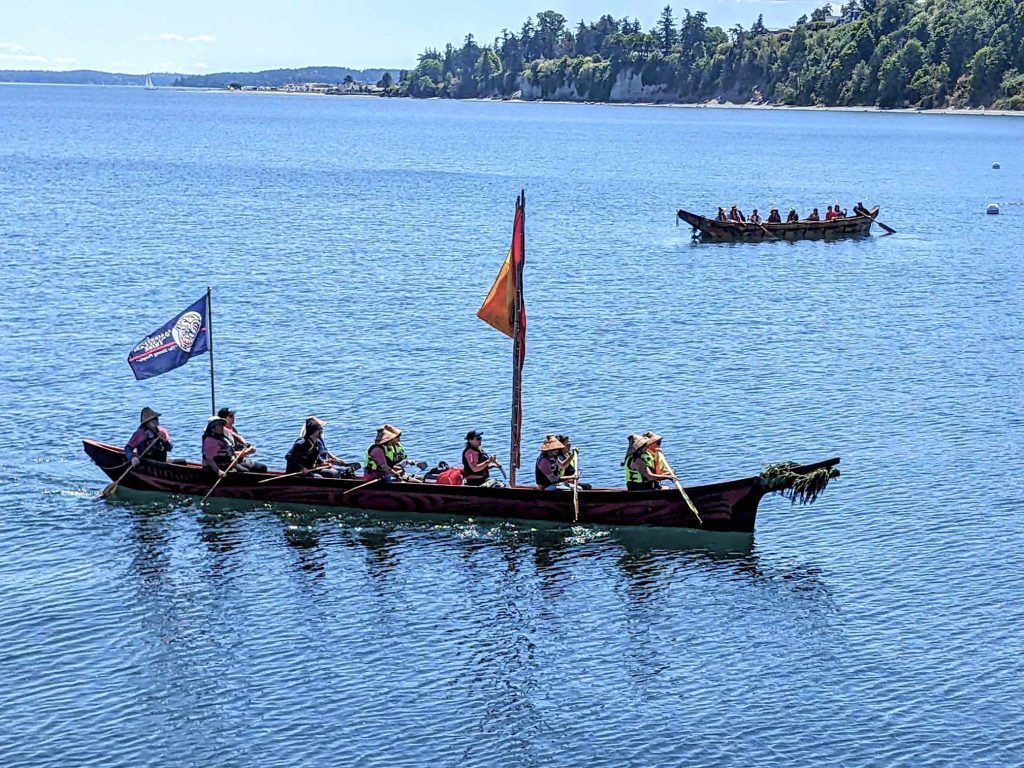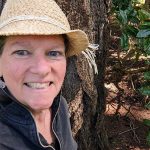Back on the water after a pandemic hiatus, Canoe Journey 2023 is returning with more area Tribes than ever. Hosting the week’s dancing, feasting, and potlatch is the Muckleshoot Tribe this year.
The elegant craftsmanship, human-powered functionality, and history imbued in these canoes is a thing of beauty and legend. To the Indigenous of the Pacific Northwest, tribal canoes are family, they each have a spirit, and they are a connection to the forests, trees, salmon, and waters that are sacred. And, these canoes are the way that families, hunting parties, fishing people, and newcomers traveled throughout the region for centuries before there were roads and other methods of getting around.

It is right, then, to honor the canoe, along with the Tribes, through their return to the water with their annual Canoe Journey. In 2003, filmmaker James Fortier of Turtle Island Productions made a documentary called Canoes – Pulling Together for the Muckleshoot Tribe in honor of the occasion. We are sharing it here to provide readers with an inside look at the pullers, canoe families, and the tradition that is Canoe Journey.
Fortier provided the following synopsis for the film: “Reflecting the traditions of their ancestors, the Muckleshoot canoe ”family’ learns to put the group before the individual in order to survive the often-treacherous waters of Washington’s Puget Sound. Chronicling their 14-day odyssey during Tribal Canoe Journey – 2003, filmmaker James M. Fortier (Biigtigong Nishnaabeg First Nation – Ojibway) captures the heart, and the heartaches of one tribe’s determined effort to share and revive their traditional canoe culture. This is a story of unity; of a group of Muckleshoot youth, men, women, and elders representing their tribal community, and learning to work together in order to overcome physical challenges, cultural differences, and personal obstacles, on a journey of self-discovery and cultural renewal. As canoe family member Les Nelson Jr. said, ‘The strongest person in the world cannot pull the canoe alone, you have to pull together.'”
Fortier followed up “Canoes – Pulling Together” with a 2006 documentary called “Gathering Together” filmed near Tacoma.
“‘Gathering Together’ goes behind the scenes to chronicle the story of the Muckleshoot Indian Tribe’s first traditional potlatch in over a century as host of the 2006 Tribal Canoe Journey,” Fortier notes. “The second film focuses on their role as host to more than 60 canoe nations from as far away as Alaska and Hawaii, who gathered for the first time on Muckleshoot territory for five days of traditional song, dance, giveaways, ceremonies, and feasts.”
The documentary uses HD footage “to capture the unique beauty of Coast Salish canoe culture. What emerges is an intimate portrait of the Muckleshoot tribe grappling with the struggle between modernity and tradition, as they nervously anticipate their formal presentations before this historic gathering of thousands.”
About filmaker James M. Fortier
Writer/Producer/Director/Cinematographer/Editor/Dedicated Historian James is an enrolled member of the Biigtigong Nishnaabeg First Nation (formerly known as Ojibways of Pic River First Nation), located in Ontario, Canada. Born in Nipigon, Ontario and raised in the Chicago area, first at Mooseheart, and then in Wheaton, James set out for California at the ripe age of 20 to complete film school at San Francisco State University and received his B.A. in Broadcast Television Arts with an emphasis on screenwriting and video production. His first documentary, “Alcatraz Is Not an Island,” won best documentary feature at the 1999 American Indian Film Festival and later screened at the prestigious Sundance Film Festival, premiering nationally on PBS and APTN in Canada in the early 2000s. He runs Turtle Island Productions. His works include “Searching for Sequoyah” and “Gifts From The Elders.”

Linda Hanlon
Linda Hanlon is the Lead Editor of The Urbanist. She cares about community-building and sharing smart ideas between communities, affordable housing, and active transportation. Safety, affordability, and access for all – regardless of age or physical ability – are starting points for her when thinking about livability. She lives in Port Townsend on the north Olympic Peninsula, the ancestral lands and home of the S’Klallam people.
